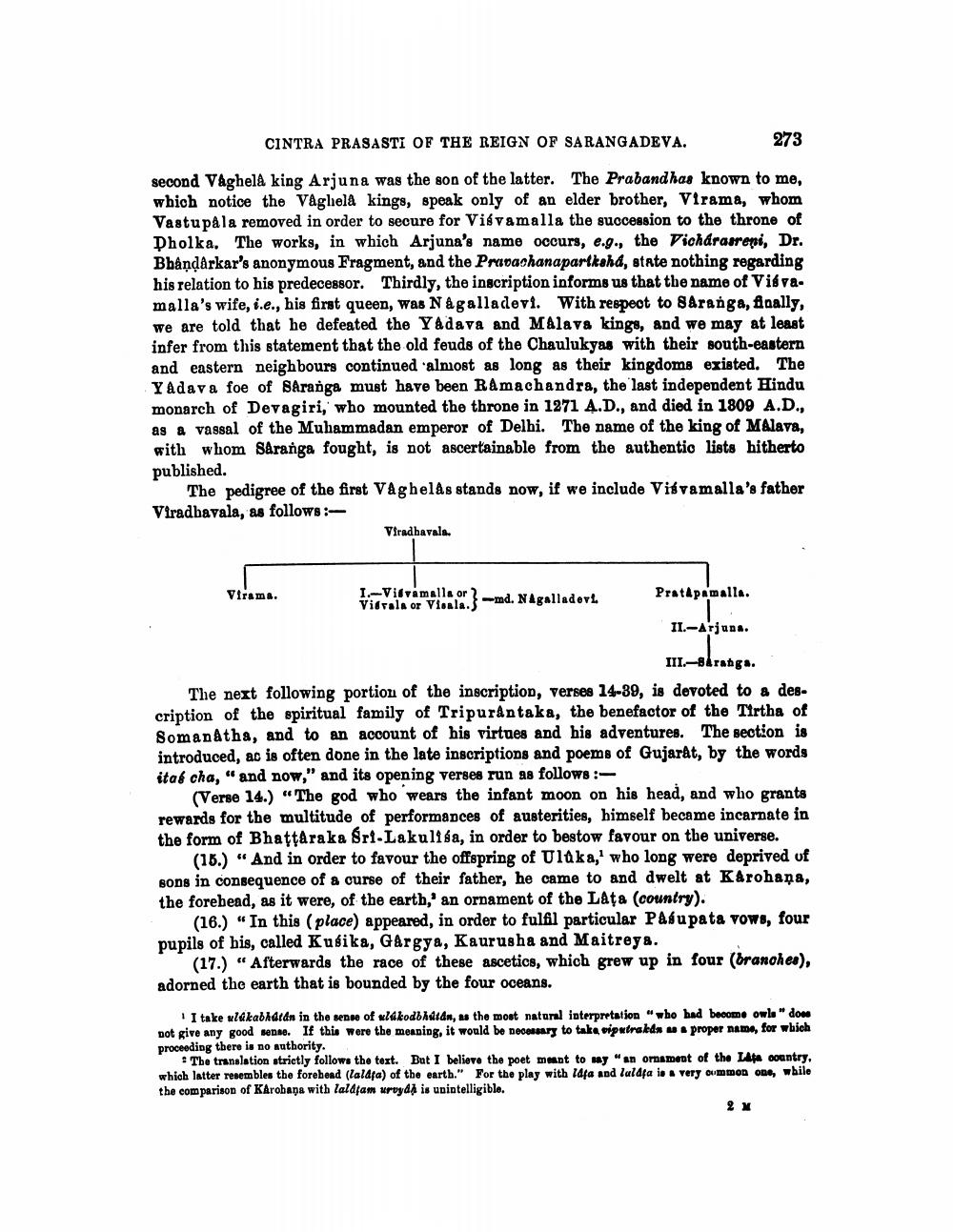________________
CINTRA PRASASTI OF THE REIGN OF SARANGADEVA.
273
second VaghelA king Arjuna was the son of the latter. The Prabandhas known to me, which notice the Vaghela kings, speak only of an elder brother, Virama, whom Vastupala removed in order to secure for Visvamalla the succession to the throne of Dholka. The works, in which Arjuna's name occurs, e.g., the Vichdrasreni, Dr. Bhandarkar's anonymous Fragment, and the Pravachanaparlkahd, state nothing regarding his relation to his predecessor. Thirdly, the inscription informs us that the name of Visva. malla's wife, i.e., his first queen, was Nagalladevi. With respect to Aranga, finally, we are told that he defeated the Yadava and Malava kings, and we may at least infer from this statement that the old feuds of the Chaulukyas with their south-eastern and eastern neighbours continued almost as long as their kingdoms existed. The Yadava foe of BAranga must have been Ramachandra, the last independent Hindu monarch of Devagiri, who mounted the throne in 1271 A.D., and died in 1809 A.D.. as a vassal of the Muhammadan emperor of Delhi. The name of the king of MAlava, with whom Saranga fought, is not ascertainable from the authentic lists hitherto published.
The pedigree of the first Vaghelås stands now, if we include Vitvamalla's father Viradbavala, as follows:
Viradhavals.
Viram.
1.-Vilamalla ord. Nagalladert Vitrals or Vienla. md. Negalladevi
Pratapamalla.
II.-Arjuna.
III.-Brabga. The next following portion of the inscription, verses 14-89, is devoted to a description of the spiritual family of Tripurantaka, the benefactor of the Tirtha of SomanAtha, and to an account of his virtues and his adventures. The section is introduced, ac is often done in the late inscriptions and poems of Gujarat, by the words ital cha, "and now," and its opening verses run as follows:
(Verse 14.) “The god who wears the infant moon on his head, and who grants rewards for the multitude of performances of austerities, himself became incarnate in the form of Bhattaraka Sri-Lakulisa, in order to bestow favour on the universe.
(16.) “And in order to favour the offspring of Uldka,' who long were deprived of Bons in consequence of a ourse of their father, he came to and dwelt at Karohana, the forehead, as it were, of the earth,' an ornament of the Lata (country).
(16.) "In this place) appeared, in order to fulfil particular Pasupata vows, four pupils of his, called Kusika, Gargya, Kaurusha and Maitreya.
(17.) “Afterwards the race of these ascetics, which grew up in four (branchea), adorned the earth that is bounded by the four oceans.
I take uldkabhdean in the sense of wldkodbhutan, as the most natural interpretation" who had become owle" dous not give any good sense. If this were the meaning, it would be necessary to taka viputra da se proper name, for which proceeding there is no authority.
• The translation strictly follows the text. But I believe the poet ment to my "an ornament of the Lata country, which latter resembles the forebend (laldra) of the earth." For the play with Ida and laldja is a very dummon one, while the comparison of Karobana with laldfam uroyd is unintelligible.
21




